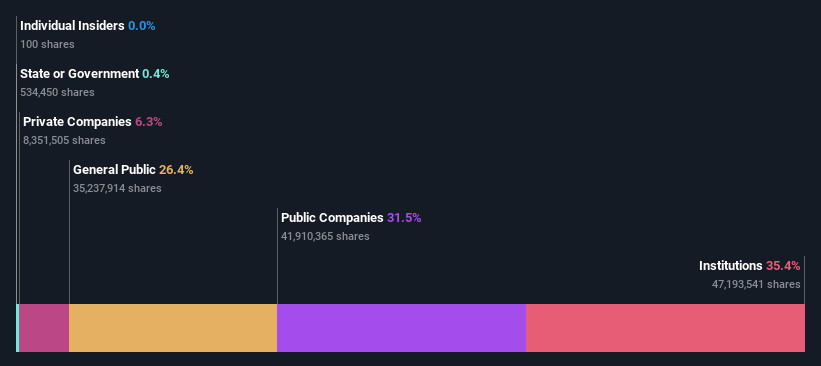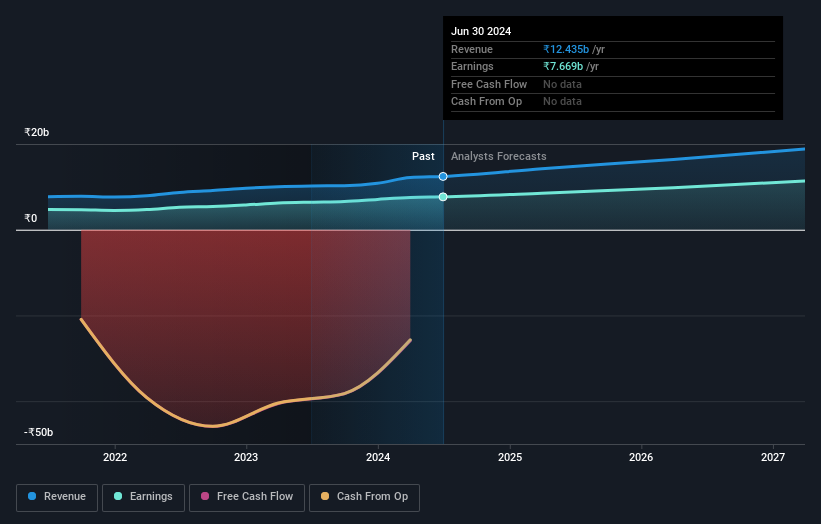- India
- /
- Diversified Financial
- /
- NSEI:CANFINHOME
Institutional investors have a lot riding on Can Fin Homes Limited (NSE:CANFINHOME) with 35% ownership
Key Insights
- Given the large stake in the stock by institutions, Can Fin Homes' stock price might be vulnerable to their trading decisions
- The top 6 shareholders own 50% of the company
- Ownership research along with analyst forecasts data help provide a good understanding of opportunities in a stock
A look at the shareholders of Can Fin Homes Limited (NSE:CANFINHOME) can tell us which group is most powerful. The group holding the most number of shares in the company, around 35% to be precise, is institutions. That is, the group stands to benefit the most if the stock rises (or lose the most if there is a downturn).
And last week, institutional investors ended up benefitting the most after the company hit ₹115b in market cap. The gains from last week would have further boosted the one-year return to shareholders which currently stand at 18%.
In the chart below, we zoom in on the different ownership groups of Can Fin Homes.
Check out our latest analysis for Can Fin Homes

What Does The Institutional Ownership Tell Us About Can Fin Homes?
Many institutions measure their performance against an index that approximates the local market. So they usually pay more attention to companies that are included in major indices.
We can see that Can Fin Homes does have institutional investors; and they hold a good portion of the company's stock. This suggests some credibility amongst professional investors. But we can't rely on that fact alone since institutions make bad investments sometimes, just like everyone does. If multiple institutions change their view on a stock at the same time, you could see the share price drop fast. It's therefore worth looking at Can Fin Homes' earnings history below. Of course, the future is what really matters.

Can Fin Homes is not owned by hedge funds. Looking at our data, we can see that the largest shareholder is Canara Bank with 30% of shares outstanding. Meanwhile, the second and third largest shareholders, hold 6.3% and 4.2%, of the shares outstanding, respectively.
We also observed that the top 6 shareholders account for more than half of the share register, with a few smaller shareholders to balance the interests of the larger ones to a certain extent.
While it makes sense to study institutional ownership data for a company, it also makes sense to study analyst sentiments to know which way the wind is blowing. There are a reasonable number of analysts covering the stock, so it might be useful to find out their aggregate view on the future.
Insider Ownership Of Can Fin Homes
The definition of an insider can differ slightly between different countries, but members of the board of directors always count. The company management answer to the board and the latter should represent the interests of shareholders. Notably, sometimes top-level managers are on the board themselves.
I generally consider insider ownership to be a good thing. However, on some occasions it makes it more difficult for other shareholders to hold the board accountable for decisions.
Our most recent data indicates that insiders own less than 1% of Can Fin Homes Limited. But they may have an indirect interest through a corporate structure that we haven't picked up on. It's a big company, so even a small proportional interest can create alignment between the board and shareholders. In this case insiders own ₹87k worth of shares. Arguably, recent buying and selling is just as important to consider. You can click here to see if insiders have been buying or selling.
General Public Ownership
With a 26% ownership, the general public, mostly comprising of individual investors, have some degree of sway over Can Fin Homes. While this group can't necessarily call the shots, it can certainly have a real influence on how the company is run.
Private Company Ownership
We can see that Private Companies own 6.3%, of the shares on issue. It's hard to draw any conclusions from this fact alone, so its worth looking into who owns those private companies. Sometimes insiders or other related parties have an interest in shares in a public company through a separate private company.
Public Company Ownership
We can see that public companies hold 31% of the Can Fin Homes shares on issue. This may be a strategic interest and the two companies may have related business interests. It could be that they have de-merged. This holding is probably worth investigating further.
Next Steps:
It's always worth thinking about the different groups who own shares in a company. But to understand Can Fin Homes better, we need to consider many other factors. Take risks for example - Can Fin Homes has 2 warning signs (and 1 which is potentially serious) we think you should know about.
But ultimately it is the future, not the past, that will determine how well the owners of this business will do. Therefore we think it advisable to take a look at this free report showing whether analysts are predicting a brighter future.
NB: Figures in this article are calculated using data from the last twelve months, which refer to the 12-month period ending on the last date of the month the financial statement is dated. This may not be consistent with full year annual report figures.
New: AI Stock Screener & Alerts
Our new AI Stock Screener scans the market every day to uncover opportunities.
• Dividend Powerhouses (3%+ Yield)
• Undervalued Small Caps with Insider Buying
• High growth Tech and AI Companies
Or build your own from over 50 metrics.
Have feedback on this article? Concerned about the content? Get in touch with us directly. Alternatively, email editorial-team (at) simplywallst.com.
This article by Simply Wall St is general in nature. We provide commentary based on historical data and analyst forecasts only using an unbiased methodology and our articles are not intended to be financial advice. It does not constitute a recommendation to buy or sell any stock, and does not take account of your objectives, or your financial situation. We aim to bring you long-term focused analysis driven by fundamental data. Note that our analysis may not factor in the latest price-sensitive company announcements or qualitative material. Simply Wall St has no position in any stocks mentioned.
About NSEI:CANFINHOME
Can Fin Homes
Provides housing finance services primarily to first-time homebuyers and professionals in India.
6 star dividend payer and fair value.
Similar Companies
Market Insights
Community Narratives



